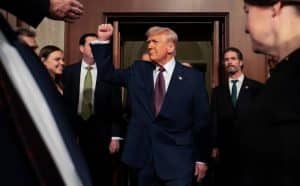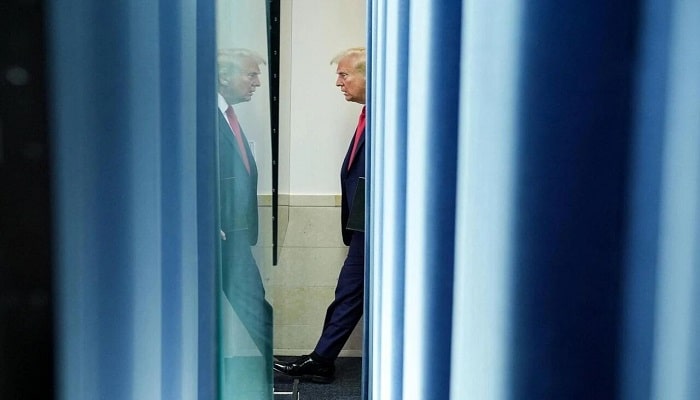PNN – Donald Trump’s campaign tactics, rooted in his past as a businessman and television personality, have now permeated his foreign policy, turning it into a grand spectacle. To better understand this strategy, we need to step back and look at his life.
Today’s political arena is a place where the boundaries between reality and spectacle are blurring day by day. US President Donald Trump is one of the most prominent international figures today, pursuing much of his identity and life on stage; it seems as if he has no intention of ever leaving the spotlight and is seeking to take advantage of every opportunity to be seen, including his claims about airstrikes on Iranian nuclear facilities, in an attempt to be in the spotlight of the world.
Trump claims that these measures were taken not only to establish peace, but also to prevent Iran from obtaining “the most destructive weapon on earth,” namely nuclear weapons, and even considers himself worthy of the Nobel Peace Prize.
These claims, which are also supported by his allies, have been made while critics, including Trump’s former national security adviser John Bolton, consider it part of a personal propaganda campaign. Bolton has repeatedly emphasized in his interviews that Trump is seeking personal prestige and branding, rather than focusing on lasting peace, just as he has tried to promote his commercial products in the past.
Buying credit and branding
This propaganda approach, rooted in his past as a businessman and television personality, has now permeated his foreign policy, turning it into a grand spectacle. To better understand this strategy, we need to step back and look at Trump’s life.
Trump appeared on the comedy show “Saturday Night Live” in 2004 to promote “Donald Trump’s Chicken Wing House.” In the ad, Trump sang among actors dressed as chickens while they danced, enthusiastically inviting customers to buy.
This scene, which entertained millions of viewers, reflected Trump’s spirit of propaganda and showmanship, a spirit that is still evident in his political behavior. He seizes every opportunity to brand himself, whether it’s promoting fried chicken or claiming to have “ended six or seven wars” in the world. These claims, often accompanied by exaggeration, are part of his strategy to buy credibility and attract public attention.

But where does this advertising spirit come from? A look at Trump’s famous book, “The Art of the Deal,” published in 1987, may answer that question. Written as a guide to business success, the book describes the key principles of hard bargain-hunting. In it, Trump emphasizes using leverage, negotiating from a position of strength, focusing on personal interests, exaggeration, threats, and reaching unilateral agreements.
Politics as a bargain and a zero-sum game
He sees dealing as an “art” that involves “thinking big and acting big,” a phrase he himself repeats in the book. For example, Trump says, “I always think big. If you’re going to think, why think small? This principle has been directly applied to his foreign policy, where he sees global crises like the war in Ukraine or the tension with Iran as a business deal. He imposes economic tariffs on allies and rivals, pursues short-term deals, and seeks personal “victories” without regard for long-term stability.
Trump also emphasizes “fighting” in the book, viewing negotiation as a “zero-one game,” with a clear winner and loser. This view is evident in the president’s foreign policy. He uses the “art of the deal” to force countries into submission, such as threatening to withdraw from NATO or putting economic pressure on China. Business Insider analysts point out that Trump ignores numbers and relies on personal instincts, which leads to chaos in his war decisions.
Trump’s foreign policy gamble
This propaganda strategy, coupled with international gambling, has turned Trump into a “gambler,” a nickname given to him by the martyred General Qassem Soleimani in 2018. In a fiery speech, the martyred Soleimani said: Mr. Trump, the gambler! Know that where you least expect it, we are near you. You start the war, but we end it. The remarks, which were particularly echoed in media outlets such as Newsweek and The Guardian, described Trump as a “casino manager” or “gambler” and warned that his threats could lead to real conflict. This nickname not only refers to Trump’s personality, but also to his risk-taking in foreign policy, such as the assassination of General Soleimani in 2020, which increased tensions.
Now, these gambles are framed within Trump’s authoritarianism, which numerous think tank reports have described as a threat to global security. Trump’s personality is described as a symbol of authoritarianism, with characteristics such as narcissism, irresponsible decision-making, and unpredictable behavior.

Trump uses social fears to create blind loyalty!
Jews United for Democracy and Justice (JUDJ), an American non-profit group founded in 2017 to counter Trump’s policies, stated in its report The Psychology of Power: The Evolution of Trump and the Authoritarian Playbook states: Trump has reinforced an authoritarian system by exploiting public anger and fear. The organization warns that Trump’s narcissism is leading to dangerous foreign policy decisions, such as his “Day One dictator” remarks that indicate a desire to concentrate power. The organization educates about these threats through educational programs and virtual events, such as the “America at a Crossroads” series, which has attracted more than 200,000 viewers.
The President is pushing his country’s foreign policy towards isolationism.
Analysts at Foreign Affairs call this the “mad man theory,” where Trump’s unpredictability is seen as a tool, but in reality, it erodes the trust of allies. The Foreign Affairs article says: Trump’s unpredictability could undermine US foreign policy, citing examples such as the Russia-Ukraine war, where his impulsive behavior has increased the risk of global chaos.
In the section on impulsive and uncritical decision-making, Foreign Affairs describes Trump as “unstable” and says this moral style is a weakness that reduces America’s negotiating power. In the context of wars, this behavior discourages allies and weakens America’s position. The University of Kansas, in its report “The Embrace of Authoritarianism in America,” notes that this authoritarianism is being fueled more by culture wars than by economics. Trump is pushing foreign policy toward isolationism, such as doubting NATO, which leaves allies vulnerable.
Authoritarian Syndrome in the White House and Its Consequences
“Democracy Magazine” in “Mass Psychology in the Age of Trump” considers him, with characteristics such as racism and xenophobia, a symbol of “authoritarian syndrome,” an issue that increases global anxiety. The authors of this article say: Trump is driving liberals into frenzy by attacking his opponents and focusing on power. This mass psychology drives supporters to violence and personalizes foreign policy.
Negative effects on foreign policy include weakening security commitments. The University of St. Andrews in its report considers the “America First” policy to be a factor in weakening NATO, a policy that increases the risk of war. American Progress, in its “100 Days of Trump’s Foreign Policy,” points to global chaos, where impulsive and emotional decisions have increased human suffering. NPR and American Progress highlight Trump’s attacks on institutions, which are eroding global trust.

